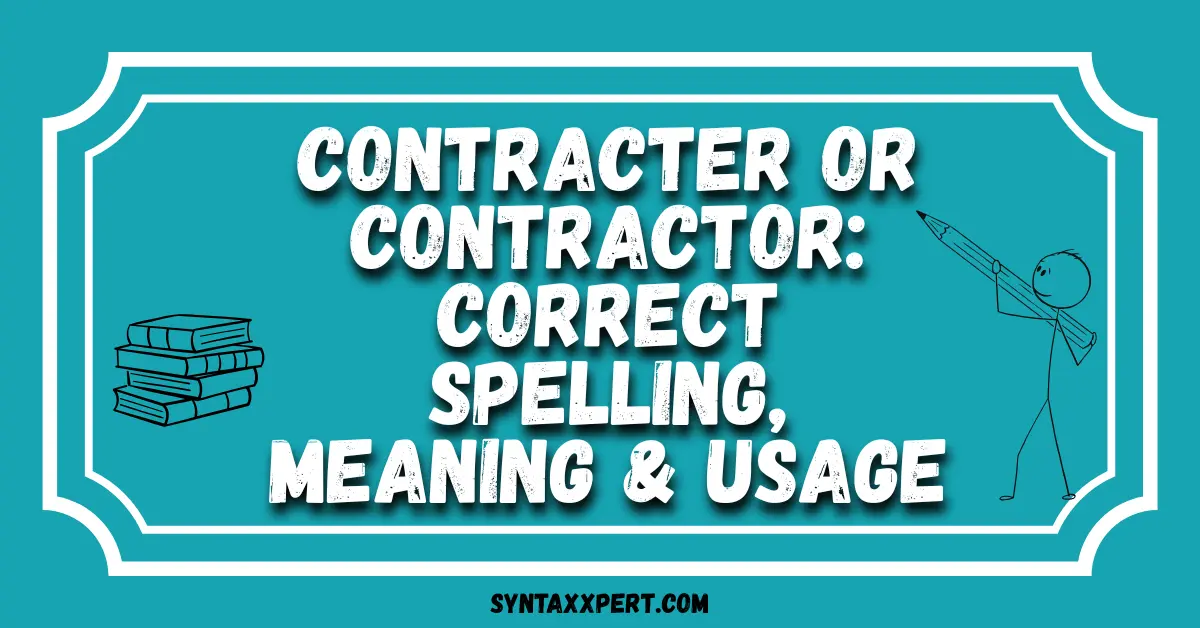When it comes to the confusion between contracter or contractor, only one spelling is correct — “contractor.” Yet, many people still use “contracter” across job listings, social media posts, and business directories. Let’s break down why “contractor” is the right form, explore its meaning, usage, examples, and how this term evolved over time.
What Does “Contractor” Mean?
A contractor is a person or company hired to perform a specific job, often under a legal contract. You’ll find contractors in fields like construction, plumbing, electrical work, IT services, freelancing, and consulting.
💬 Quote: “A contractor delivers work, but a good contractor delivers trust with every project.”
| Field | Example Contractor Type | Common Tasks |
| Construction | Building Contractor | Supervises building projects |
| Technology | IT Contractor | Software development or tech support |
| Home Services | Electrical Contractor | Installs or repairs electrical systems |
| Creative Industry | Freelance Contractor | Graphic design, copywriting, or content creation |
Why “Contracter” Is Incorrect
The word “contracter” is a common misspelling and is not recognized in English dictionaries like Oxford, Cambridge, or Merriam-Webster. The confusion arises because many English words ending in -er (like writer, painter, teacher) describe people who perform actions. But in this case, the correct suffix is -or — “contractor.”
✅ Correct: Contractor ❌ Incorrect: Contracter
Grammar Tip
The suffix “-or” is used when the root word is derived from Latin verbs ending in “-ate.” For example: dictate → dictator, create → creator, contract → contractor.
The Etymology of “Contractor”
The term “contractor” originates from the Latin word “contractus,” meaning drawn together or agreement. It entered English usage in the 16th century, referring to a person or entity that enters into a contract to supply materials or perform services.
| Origin | Word | Meaning |
| Latin | Contractus | Drawn together, agreement |
| Old French | Contracter | To agree or make a contract |
| English | Contractor | One who performs under a contract |
Common Usage in Sentences
Here’s how the correct word “contractor” fits naturally in English sentences:
- We hired a contractor to renovate our kitchen.
- The electrical contractor fixed the faulty wiring.
- Many independent contractors work remotely in today’s digital economy.
- The company signed a contract with the main contractor for the new bridge.
Contractor vs Employee — What’s the Difference?
A contractor works independently, while an employee works under a company’s direct supervision.
| Feature | Contractor | Employee |
| Contract Type | Short-term or project-based | Permanent or long-term |
| Payment | Per project or hourly | Fixed salary |
| Flexibility | High | Limited |
| Tax Responsibility | Self-managed | Employer-managed |
Case Study: Freelance Contractor
Sarah, a freelance graphic designer, works as a contractor for several marketing agencies. She signs short-term contracts, manages her own taxes, and chooses her projects — flexibility she wouldn’t have as an employee.
Variations and Related Terms
Here are some related and LSI terms often used with “contractor”:
- Independent contractor
- General contractor
- Subcontractor
- Freelance contractor
- Licensed contractor
- Building contractor
- Home improvement contractor
- Contract agreement
- Contractor license
- Construction firm
Each of these variants is context-specific, so the right term depends on the field or profession.
Why People Misspell “Contractor” as “Contracter”
There are three main reasons behind this misspelling:
- Phonetic Confusion – “Contracter” sounds correct because of its “-er” ending.
- Typing Errors – People unconsciously type -er due to familiarity with words like teacher.
- Lack of Awareness – Many online posts repeat the error, reinforcing the wrong spelling.
Example Search Volume Insight: According to Google Trends, “contractor” has over 1 million global searches per month, whereas “contracter” receives only a few thousand — mostly from spelling error queries.
SEO Tip for Businesses
If you’re running a construction or service website, make sure you:
- Use the correct keyword “contractor” in your content.
- Add “contracter” as a misspelling keyword in your metadata for broader coverage.
- Optimize image alt-text with natural variations like “licensed contractor”, “home repair contractor”, and “building services contractor.”
🔍 Pro Tip: Use both “contractor” and common search variations in your FAQ or glossary to capture extra search traffic.
READ MORE >>> Kippers vs Sardines: Key Differences, Taste & Nutrition Facts
Examples of Contractor Titles in Real Jobs
| Job Role | Correct Title | Incorrect Version |
| Builder | Construction Contractor | Construction Contracter |
| Electrician | Electrical Contractor | Electrical Contracter |
| IT Professional | Software Contractor | Software Contracter |
| Painter | Painting Contractor | Painting Contracter |
Quick Recap: The Correct Word
- ✅ The right spelling: Contractor
- ❌ Wrong spelling: Contracter
- 💡 Origin: Latin contractus → English contractor
- 📘 Used for: People or companies working under a contract
- 📈 SEO insight: “Contractor” has 100× higher search volume than “contracter”
FAQs
Which is correct: contracter or contractor?
The correct spelling is contractor. “Contracter” is a common misspelling not found in standard dictionaries.
Why do people spell contractor as contracter?
Because “-er” is a common English ending (like teacher or painter), many people mistakenly write contracter instead of contractor.
What does the word “contractor” mean?
A contractor is a person or company hired to perform specific work under a legal contract, often in construction or freelance fields.
How can I remember the correct spelling?
Think of words ending in “-or” derived from Latin verbs ending in “-ate” — like creator, dictator, contractor.
Is ‘contracter’ ever acceptable in UK or US English?
No. Both British and American English recognize only contractor as the correct form. “Contracter” is always incorrect.
Can I use ‘contracter’ as an SEO keyword?
Yes, but only as a misspelling keyword to capture users searching it by mistake. The main focus should always remain on contractor.
What’s the difference between a contractor and an employee?
A contractor works independently under short-term contracts, while an employee works permanently under company management.
What are the types of contractors?
Common types include general contractors, independent contractors, subcontractors, and freelance contractors.
What industries hire contractors most often?
The construction, IT, home services, and creative industries frequently rely on contractors for specialized projects.
How can businesses optimize SEO for contractor services?
Use relevant keywords like licensed contractor, construction services, and independent contractor naturally across your website content.
Final Thoughts
Language evolves, but accuracy matters — especially in business. If you’re writing a job listing, website content, or legal contract, always use the correct spelling: “contractor.”
“Good spelling builds credibility. A single extra letter can cost trust — and clients.”
Whether you’re an independent contractor or someone hiring one, precision in words reflects professionalism in work. Remember, “contractor” is not just correct — it’s the key to clarity and credibility.

I’m Luna Hazel, a grammar expert here to help you master the art of clear, confident writing. Let’s make every word count!

